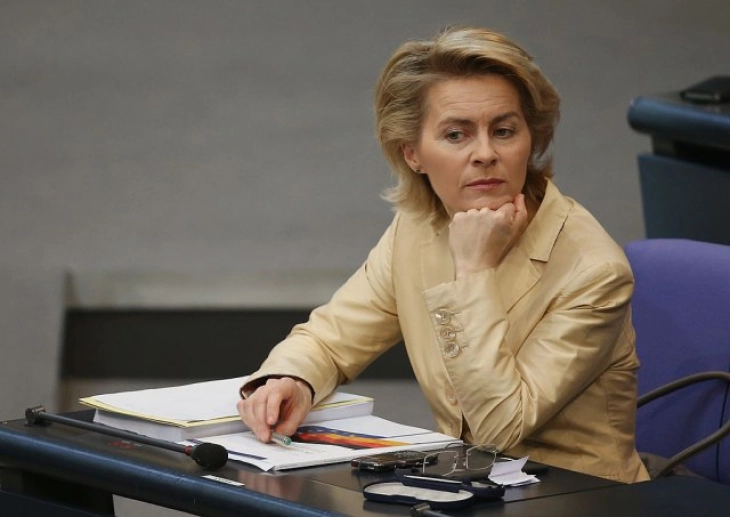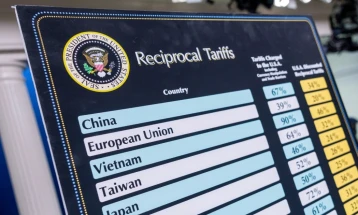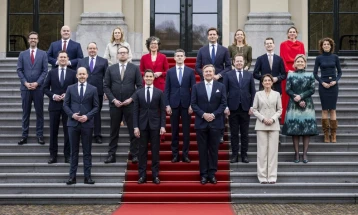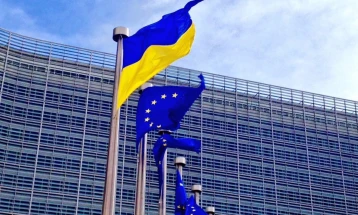Von der Leyen faces tough vote for second term as commission chief
- The European Parliament on Thursday votes on a second term for Ursula von der Leyen as president of the European Commission in what is set to be a close contest.
- Post By Silvana Kocovska
- 08:30, 18 July, 2024

Strasbourg, France, 18 July 2024 (dpa/MIA) - The European Parliament on Thursday votes on a second term for Ursula von der Leyen as president of the European Commission in what is set to be a close contest.
The German member of the centre-right European People's Party (EPP) will give a speech to convince EU legislators to back her before the start of the debate and vote.
The former German defence minister must tread a fine line in her rhetoric for different parliament political groups to support her - offering policy concessions and promises in equal measure.
Von der Leyen needs to get a majority of at least 361 votes in the 720-seat chamber to be re-elected.
EU lawmakers are gathered in Strasbourg, France for the first time since the European elections, characterized by a shift in support to the right across the European Union.
Despite the power shift, von der Leyen faces a tight vote - in 2019 she secured the post by only nine votes - although her EPP group is the largest in the parliament with 188 seats.
Since her nomination by EU leaders in June, von der Leyen has tried to build a broad coalition of support in the EU legislature to secure a second term.
The centre-left Socialists and Democrats (S&D) and the liberal Renew Europe groups are the main sources of votes in the centrist coalition to re-elect von der Leyen, with 136 and 77 seats respectively.
On paper, von der Leyen has a majority with this coalition with 401 seats from these three groups. However, defections are possible under the vote's secret ballot.
Pan-European political groups in the European Parliament are formed when political parties band together from at least seven EU countries with a minimum of 23 EU legislators.
For this reason, groups can be fairly loose and are not guaranteed to vote as a single bloc every time in the parliament due to policy differences.
Von der Leyen is not even guaranteed to gain every vote from her own group, the EPP, due to disagreements over the impact of climate policy on farmers, for example.
During the European elections, von der Leyen courted support among EU legislators from the Italian Prime Minister Giorgia Meloni's far-right Brothers of Italy (FdI) as a buffer.
However, the S&D and liberal Renew Europe warned von der Leyen against cooperating with far-right parties to secure another term and she has since cooled on support from the FdI.
The Greens meanwhile could play a decisive role should von der Leyen need their support. Despite suffering heavy losses in the European elections, the environmentalists hold 53 seats.
The commission president leads the EU's powerful executive arm, charged with developing new EU policies, enforcing existing EU laws and representing the bloc at international summits like the G7.
Von der Leyen has campaigned on her crisis management record in response to the full-scale Russian invasion of Ukraine and the Covid-19 pandemic.
However, her management style, reluctance to speak with the media and transparency record in office have drawn criticism from her opponents.
While von der Leyen secured a major deal with Pfizer to procure Covid-19 vaccines in 2021, the terms of the contracts - including what price the EU paid - have never been made public.
On Wednesday, an EU court ruled that the commission under von der Leyen had failed to give the public sufficient access to the purchase agreements for Covid-19 vaccines.
EU lawmakers and citizens asked the commission to publish the agreements under the bloc's freedom of information laws, but the commission only released redacted versions, so they took legal action.
The court's decision came as a blow to von der Leyen ahead of the crunch vote and only provided further fodder for her critics.
Should von der Leyen fail to get the approval of the EU legislature, EU leaders have one month to come up with a new candidate - a scenario most are keen to avoid for the sake of EU stability.
Photo: MIA archive







